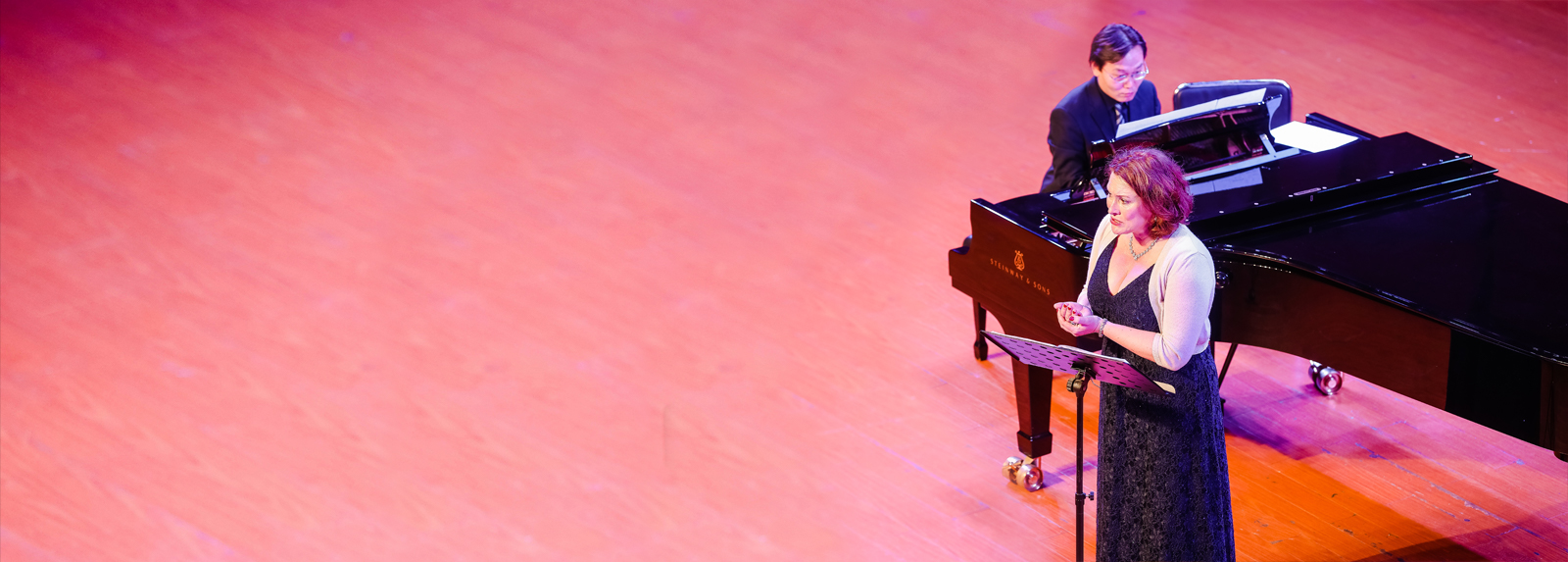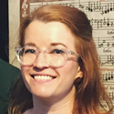View semester dates
2 years part-time

Extend your solo performance skills and potential as a versatile singer.
Year of entry: 2026 (September)
Our MA Music Performance: Vocal Studies is practitioner-led and designed to help you discover and establish your unique, authentic voice and sense of artistry. It will foster your initiative and creativity by sustaining and developing your vocal technique, knowledge and repertoire.
Intensive individual teaching combines with collaborative peer learning sessions, coaching with professional accompanists, and performance classes that encourage curiosity, diversity, and excellence, enriching your potential as a distinctive, versatile musician.
This course is led by Susan Young, who has considerable experience as both a dedicated teacher, a vocal health specialist, and an active performer with great industry knowledge and insight. Her current and former students can be found in international opera companies, young artist programmes, West End musicals, award-winning professional consorts and choirs, as well as music administration and teaching posts.

Susan is a once-in-a-lifetime singing teacher who gets your best possible sound out of you. She is a superb technician who gives you the tools to find your way around your own voice. Her knowledge of a vast range of repertoire and of the current working industry is invaluable.
Throughout the year, you'll work individually and collaboratively to develop and hone your solo performance skills within a supportive environment. Seminars/workshops and performance classes will cover a range of relevant topics, including vocal health, technique, reflective practice, language, text and poetry, imagination and drama skills. Repertoire is likely to include opera, musical theatre, art song and contemporary classical. Please note we do not currently offer pop and rock genres. We place an emphasis on independence and creativity - you will have the freedom to study the areas that interest you, in consultation with your supervisor.
Over the year, you’ll study a series of core and option modules. In addition, we strongly encourage you to participate in musical ensembles such as the University Choir and The 24, and to attend weekly research seminars, performance classes and other seminars relevant to your studies. You’ll receive a very generous allowance of high-quality individual singing lessons spread evenly throughout the year, tailored to your needs.
You'll also take one option module. Examples from previous years have included:
Some option module combinations may not be possible. The options available to you will be confirmed after you begin your course.
Our modules may change to reflect the latest academic thinking and expertise of our staff, and in line with Department/School academic planning.
Your course will conclude with a substantial public recital showcasing your artistic and scholarly insight through a programme of your own design.
Every course at York is built on a distinctive set of learning outcomes. These will give you a clear understanding of what you will be able to accomplish at the end of the course and help you explain what you can offer employers. Our academics identify the knowledge, skills, and experiences you'll need upon graduation and then design the course to get you there.
| Study mode | UK (home) | International and EU |
|---|---|---|
| Full-time (1 year) | £12,000 | £27,250 |
| Part-time (2 years) This is the year 1 fee. Fees for future years are subject to confirmation. |
£6,000 | £13,625 |
Students on a Student Visa are not currently permitted to study part-time at York.
For courses which are longer than one year, the tuition fees quoted are for the first year of study.
UK (home) or international fees? The level of fee that you will be asked to pay depends on whether you're classed as a UK (home) or international student. Check your fee status.
Find out more information about tuition fees and how to pay them.
Discover your funding options to help with tuition fees and living costs.
We'll confirm more funding opportunities for students joining us in 2026/27 throughout the year.
If you've successfully completed an undergraduate degree at York you could be eligible for a 10% Masters fee discount.
We are pleased to work with Chevening Scholars to offer funding for our Masters programmes. Chevening Scholarships provide one year of fully-funded postgraduate study in the UK for international (including EU) students. The scholarships are open to early and mid-career professionals who have the potential to become future leaders.
You’ll work with world‐leading academics who’ll challenge you to think independently and excel in all that you do. Our approach to teaching will provide you with the knowledge, opportunities, and support you need to grow and succeed in a global workplace.
Your teaching will largely take the form of weekly seminars, performance classes, solo voice lessons and tutorials. Our holistic approach aims to respond to different learning styles.
You will have regular meetings with your supervisor, who will advise you and help develop your ideas as you progress through your studies.
We encourage you to get involved with our lively community, from our composers, instrumentalists and accompanists to our ensembles, weekly workshops, performance classes and research seminars.
We have a range of outstanding facilities, including the Sir Jack Lyons Concert Hall and dozens of teaching rooms and practice facilities. All spaces are designed to be flexible and are used for projects, seminars, ensemble rehearsals and recordings. Discover our facilities.
Your teaching will take place within the School of Arts and Creative Technologies, which has sites on both Campus West and Campus East. Almost all of your teaching will take place within the School
Our beautiful green campus offers a student-friendly setting in which to live and study, within easy reach of the action in the city centre. It's easy to get around campus - everything is within walking or pedalling distance, or you can always use the fast and frequent bus service.
You will design and present up to two recitals of up to 30 minutes, and a final recital of 40-45 minutes. The length of the final recital may be reduced and presented in combination with a piece of written work. Programmes will be assessed on criteria including technical command, interpretative and historical insight, and creativity. Alongside these you will have written and presentation assessments designed to help you develop communication and research skills relevant to your work as a performer.
This course is beneficial to students wishing to gain vital skills and insight for performing their repertoire professionally, enabling them to be competitive, versatile and responsive to the demands of life as a creative artist in the 21st century. It may prepare them for further study in fields such as opera or education or enrich current professionals looking for continuing development.
| Qualification | Typical offer |
|---|---|
| Undergraduate degree | 2:2 or equivalent in Music or another relevant subject. |
| Other international qualifications | Equivalent qualifications from your country |
You will need to submit a sample of your creative work with your application. Please see our guidance on submitting creative work.
If English isn't your first language you may need to provide evidence of your English language ability. We accept the following qualifications:
| Qualification | Minimum requirement |
|---|---|
| IELTS (Academic and Indicator) | 6.0, minimum 5.5 in each component |
| Cambridge CEFR | B2 First: 169, with no less than 162 in each component |
| Oxford ELLT | 6, minimum of 5 in each component |
| Oxford Test of English Advanced | 126, minimum 116 in each component |
| Duolingo | 105, minimum 95 in all other components |
| LanguageCert SELT | B2 with 33/50 in each component |
| LanguageCert Academic | 65 with a minimum of 60 in each component |
| Kaplan Test of English Language | 444-477, with 410-443 in all other components |
| Skills for English | B2: Pass with Merit overall, with Pass in each component |
| PTE Academic | 55, minimum 51 in each component |
| TOEFL | 79, minimum 17 in Listening, 18 in Reading, 20 in Speaking and 17 in Writing |
| Trinity ISE III | Pass in all components |
For more information see our postgraduate English language requirements.
You may be eligible for one of our pre-sessional English language courses. These courses will provide you with the level of English needed to meet the conditions of your offer.
The length of course you need to take depends on your current English language test scores and how much you need to improve to reach our English language requirements.
After you've accepted your offer to study at York, we'll confirm which pre-sessional course you should apply to via You@York.



